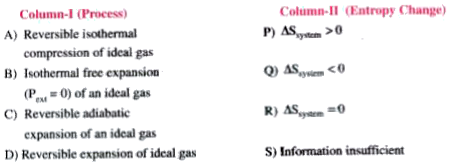For a system in equilibrium Δ G= 0 under conditions of constant: Solution in Telugu
temperature and pressure
temperature and volume
pressure and volume
energy and volume
The correct Answer is:A
(ΔG)T,P=0 for equilibrium
Topper's Solved these Questions
- BOOK - AAKASH SERIESCHAPTER - CHEMICAL THERMODYNAMICSEXERCISE - LECTURE SHEET (EXERCISE-III) (LEVEL - II (ADVANCED) MATRIX MATCHING TYPE QUESTIONS)2videos
CHEMICAL THERMODYNAMICS
- BOOK - AAKASH SERIESCHAPTER - CHEMICAL THERMODYNAMICSEXERCISE - LECTURE SHEET (EXERCISE-III) (LEVEL - II (ADVANCED) INTEGER TYPE QUESTIONS)5videos
CHEMICAL THERMODYNAMICS
- BOOK - AAKASH SERIESCHAPTER - CHEMICAL THERMODYNAMICSEXERCISE - LECTURE SHEET (EXERCISE-III) (LEVEL - II (ADVANCED) MORE THAN ONE CORRECT ANSWER TYPE QUESTIONS)5videos
CHEMICAL THERMODYNAMICS
- BOOK - AAKASH SERIESCHAPTER - CHEMICAL THERMODYANMICS EXERCISE - Questions For Descriptive Answers28videos
CHEMICAL THERMODYANMICS
- BOOK - AAKASH SERIESCHAPTER - ELECTRON MIGRATION EFFECTS EXERCISE - QUESTIONS FOR DESCRIPTIVE ANSWERS10videos
ELECTRON MIGRATION EFFECTS
Similar Questions
 01:32View Solution
01:32View SolutionIn how many of the following entropy increases?
(a)N2(g)+3H2(g)→2NH3(g)(b)PCl5(g)→PCl3(g)+Cl2(g)(c)H2O(s)→H2O(g)(d)H2O(l)→H2O(g)(e)2NaHCO3(s)→Na2CO3(s)+H2O(g)+CO2(g)(f)NH2CO2NH4(s)→2NH3(g)+CO2(g)(g)H2O(l)→H2O(s)(h)CO2(s)→CO2(g)00:55View SolutionAll the antural processes in this universe produce
01:19View SolutionHow does heat of neutralisation value change with the chemical nature of acid and base?
01:19View SolutionHyperconjugation effect is also termed as 'no bond resonance'. Why?
01:44View SolutionA change in the free energy of a system at constant temperature and pressure will be: Delta_(sys)G = Delta_(sys)H -T Delta_(sys)S At constant temperature and pressure Delta_(sys) G lt 0 (spontaneous) Delta_(sys)G = 0 (equilibrium) Delta_(sys)G gt 0 (non-spontaneous) For a system in equilibrium, DeltaG = 0 , under conditions of constant
02:49View SolutionIn an equilibrium reaction for which Delta G^(@) = 0 , the equilibrium constant K =
01:43View SolutionFor a system in equilibrium, ΔG=0, under conditions of constant
02:41View SolutionFor a system in equilibrium, ΔG=0, under conditions of constant
01:51View SolutionWrite the relation between Delta G^(@) and equilibrium constant.
00:45View SolutionUnder what conditions will a system be in themodynamic equilibrium?
01:21View SolutionUnder which of the following conditions is the relation ΔH=ΔU+pΔV valid for a closed system ?
02:36View SolutionFor a system in equilibrium, △G=0 under conditions of constant ......
01:13View SolutionA reaction attains equilibrium state under standard conditions, then A) equilibrium constant K=0 B) equilibrium constant "K=1 C) Delta G^(o)=0 and Delta H^(o)=T Delta S^(o) D) Delta G=0 and Delta H = T Delta S
03:47View SolutionFor a system in equilibrium Δ G= 0 under conditions of constant:
02:03View Solution

